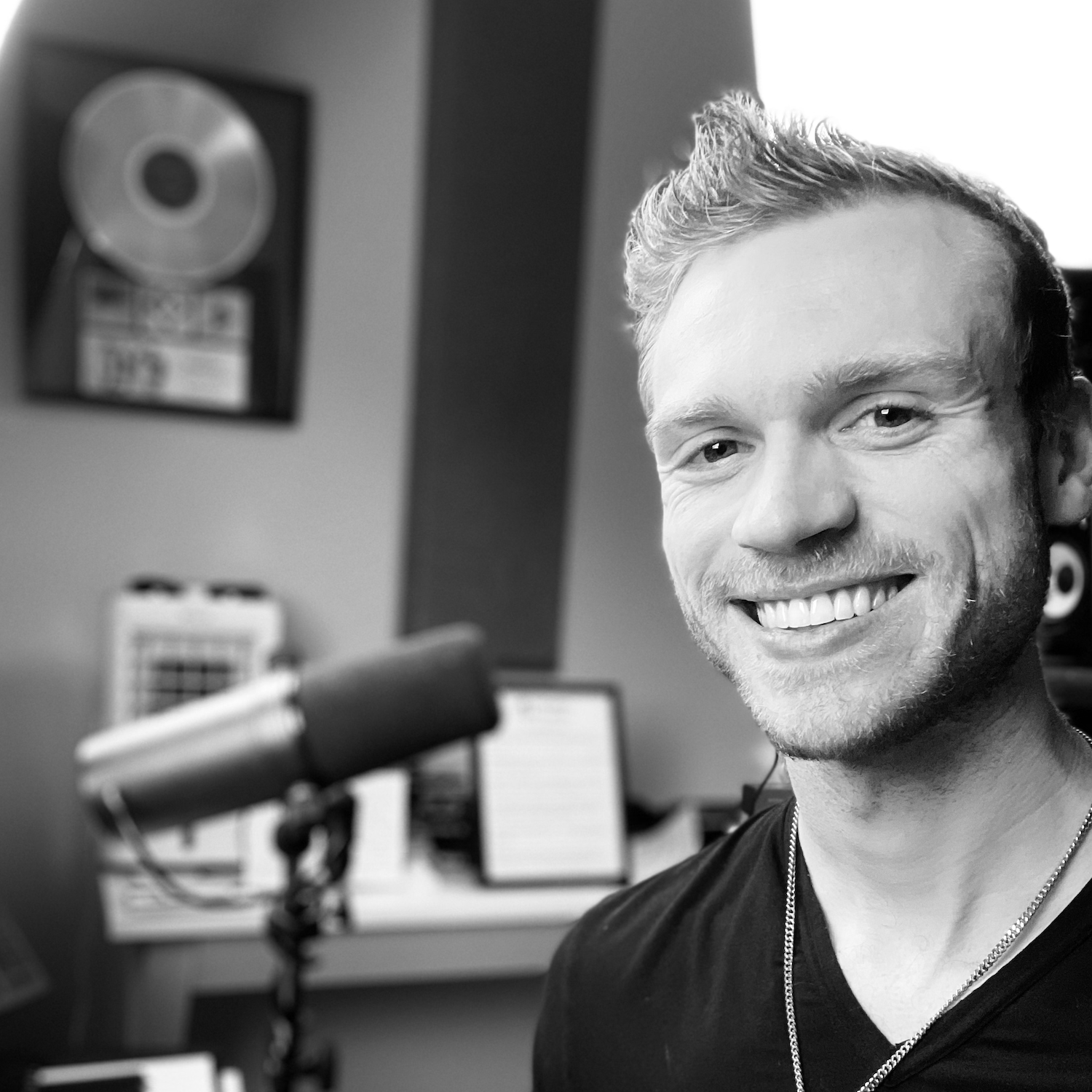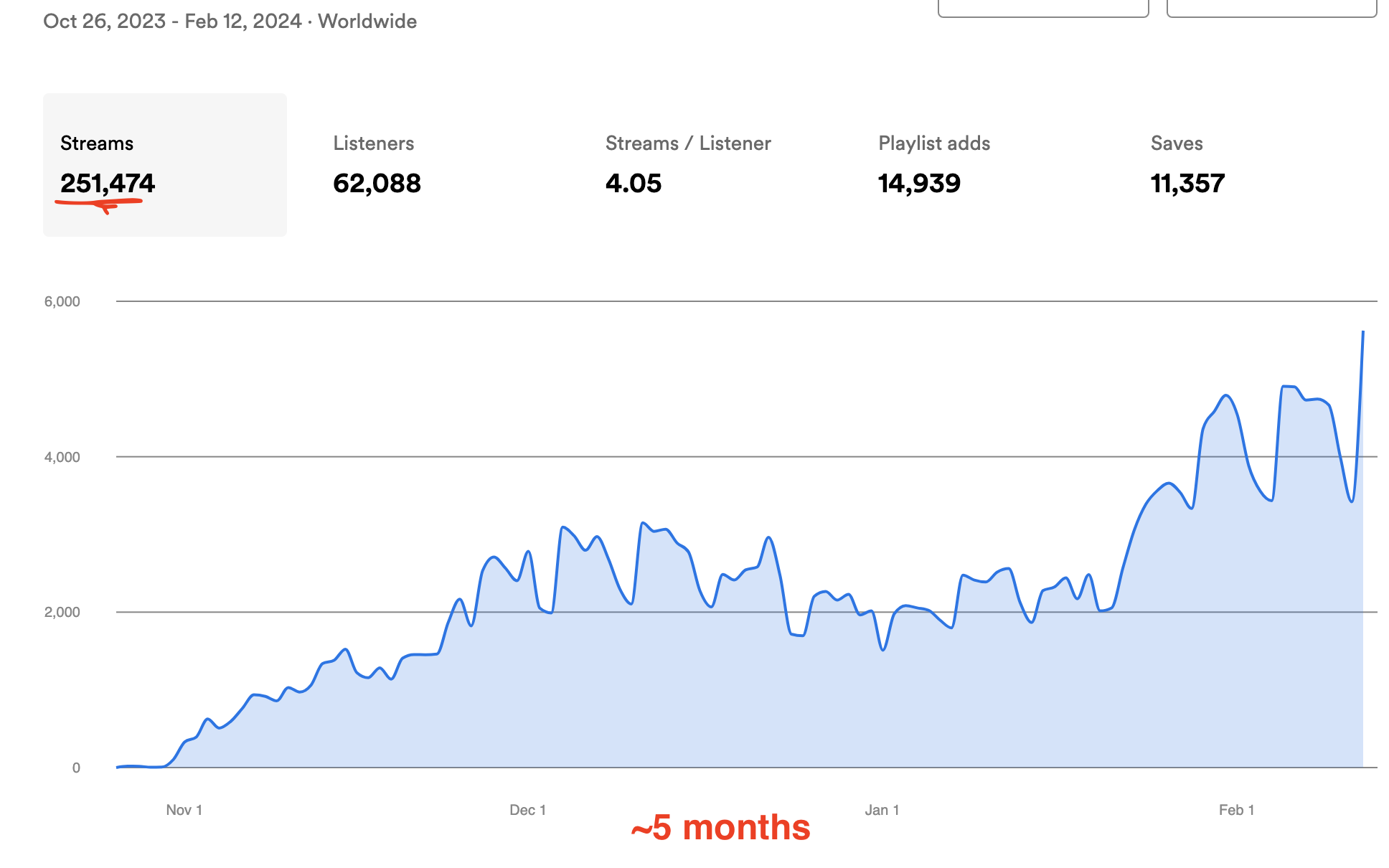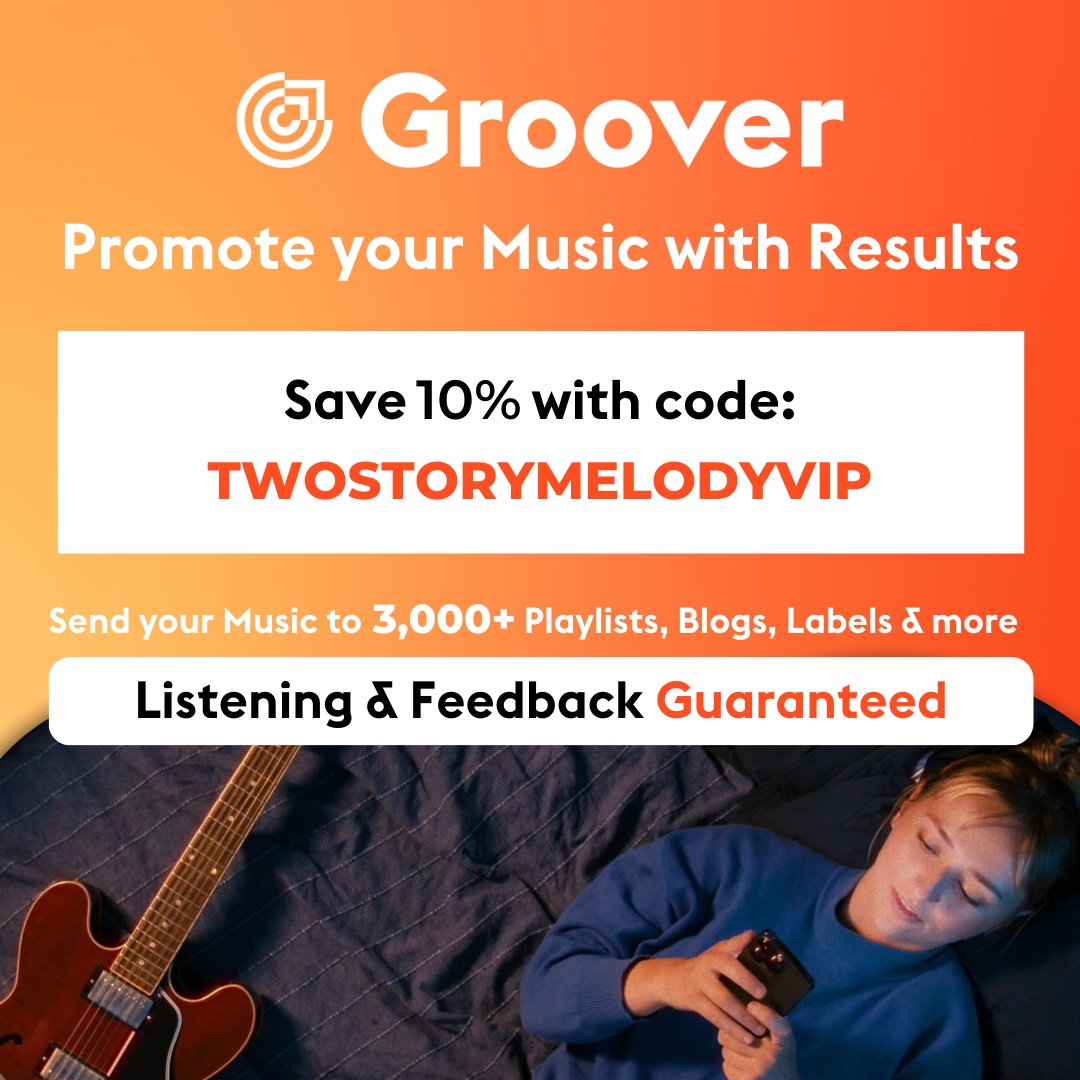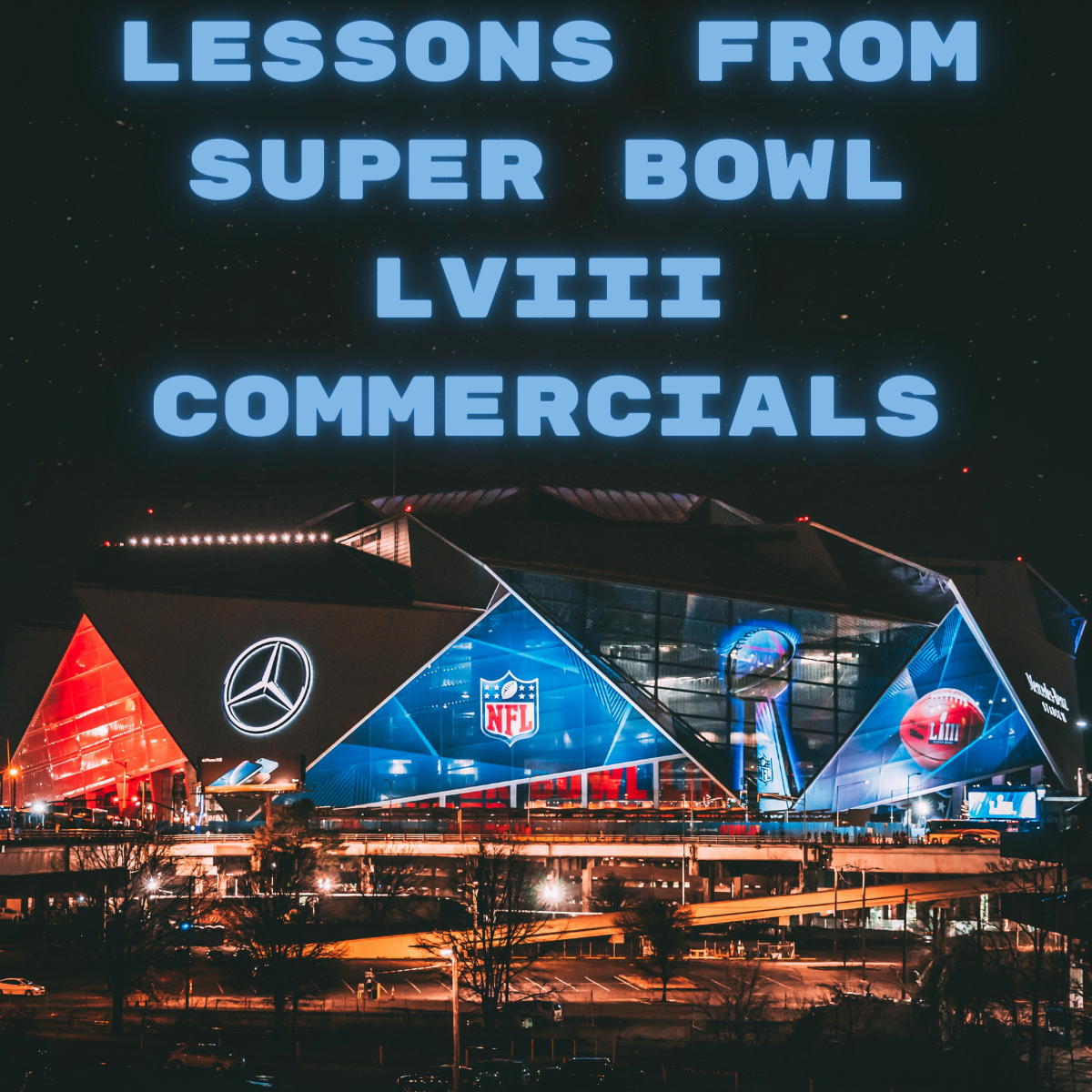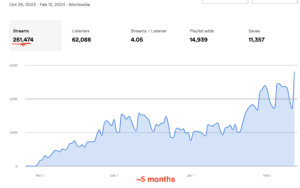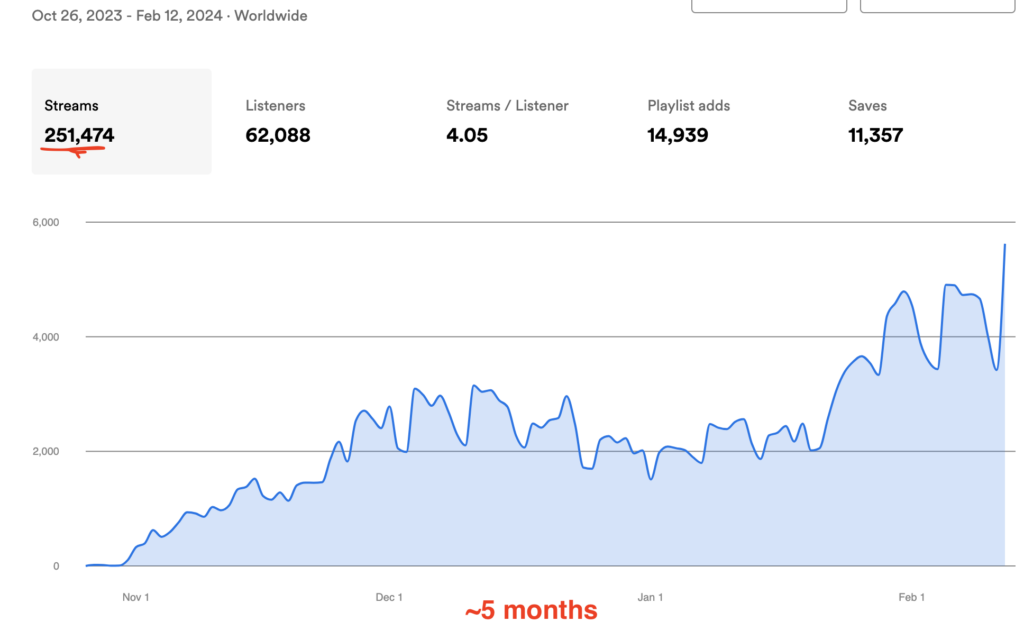I had a friend in college who was pretty into a band called Paradise Fears.
Okay, I kind of shortchanged that.
He wasn’t just “pretty into” them – actually, I’d say he was the definition of a Paradise Fears fan.
He’d get hyped on their singles. He’d blast their albums. He’d pump their YouTube pop song covers.
It was… a lot ha. And, honestly, it kind of wore me out on the group; I went from thinking, “Huh, you’re right, their lead singer does have kind of an interesting voice” to thinking, “Huh, if I hear their lead singer’s voice one more time I am going to stick my head in a microwave.”
It was a good thing that I only lived with my friend for one year. And also a good thing that we didn’t have a microwave in the dorm room.
Anyway, fast forward a few years, and I’d pretty much purged the whole idea of Paradise Fears from my mind. I was working at a marketing agency and building Two Story Melody on the side, which meant that I was watching and reading a bunch of music marketing content to stay up-to-date on the industry.
I think that’s how I bumped into Michael Walker.
I’m not sure how I first found him. I might’ve been targeted through Facebook or Instagram ads (I was definitely in his target audience), or maybe I stumbled across his podcast. Regardless, when I clicked through to read about his stuff, I was immediately intrigued, because, right there, in his bio, was the trigger: “He and his band Paradise Fears went from living out of their cars to selling 24,000 albums in 6 months.”
Wait… Paradise Fears?
…And the memories of my college friend streaming the track “Home” on repeat came flooding back.
Long-story-short: I had firsthand proof that the way Michael and his band approached music marketing really (really) worked.
So, I signed up for Michael’s email list, partly out of respect for my old friend and mostly because I figured that Michael would have an interesting perspective. Good news: He does.
And, in a twist that I’m certain would make my old friend give a yip of surprise, I recently had the chance to hop on a call with Michael. We talked through how Paradise Fears was able to cultivate such a dedicated following – and how he’s used his experiences in the band to build tools and training programs that are benefitting thousands of musicians.
Below is the full recording of the interview:
For my takeaways and the condensed version, keep reading.
1. Michael’s journey hasn’t been a straight path to success.
During our conversation, we talked through two stories: 1) the story of Michael’s band, Paradise Fears, and 2) the story of Michael’s business, Modern Musician.
Both stories involve twists, turns, and setbacks. But, ultimately, both involve a lot of success, too.
The story of Paradise Fears
Just in case you’re not my old college friend and aren’t intimately familiar with the band, here’s the brief: Paradise Fears was a group of friends from a small town in South Dakota who eventually ended up on Warped Tour, playing alongside acts that they’d looked up to (like All Time Low and Blink-182).
Michael told me that, when the group first committed to doing music, they booked a tour they were really proud of with dates at bars and venues around the country. There was only one problem: When they actually played the shows, barely anyone showed up.
“Sometimes it was literally just the bartender in the back of the room,” Michael says. “At that point, we were living in our van, sleeping at Walmart parking lots, eating peanut butter and flour tortillas.”
Definitely not glamorous, right?
Honestly, this is the part of the story where a bunch of bands give up.
But Michael and his friends kept at it, and it’s a good thing they did. Their fortunes ended up improving far more quickly than they could have predicted, thanks to a technique that would later come to be known as “tour hacking.”
The concept is dead simple and also dead crazy: You walk up to fans who are standing outside of venues waiting to see other, more established bands in your genre, and you ask those people to listen to your music. Michael said they’d literally bring headphones with them and play sample clips of their songs.
“It’s terrifying,” Michael says. “You literally would rather do anything else.”
But, here’s the thing: It works.
The members of Paradise Fears followed other bands’ tours, recruited fans of similar music, and got a bunch of people to come out to their shows.
They ended up blowing up in about six months.
That’s wild. And it set the stage for what would be Michael’s next act.
The story of Modern Musician
The group rode the wave of momentum and toured successfully for years. Eventually, though, a few of the members felt the pull away from touring / traveling and toward a more settled phase of life, and so the band slowed down.
Michael felt the call to a more settled life, too; he was in a long-term relationship and was ready to enter into more responsibility, but he also knew that he didn’t want to work a 9-5 that he wasn’t passionate about.
“There was this whole transition where I was trying to figure out what was next,” he says. “My whole identity and ego had been about the band… we’d been touring full-time and it was something I felt really proud of. I remember when I found out I was going to be a dad, and I just thought, ‘How am I going to provide for them without touring?'”
That’s when he stumbled across Jeff Walker.
Jeff’s the founder of something he calls the Product Launch Formula. Basically, he teaches people how to build online businesses. He’s one of the OG internet marketers, and, by all accounts, a super nice guy. Michael, looking for a lifeline, scrapped together a hefty bit of cash and gave Jeff’s program a shot.
The shot failed.
That’s because Michael started by trying to sell a course on how to play piano, working under the assumption that the fanbase he’d built with Paradise Fears would support him.
“It was called ‘Piano Rockstar,'” Michael recalls. “I thought I’d be able to instantly go full-time with it. And a few people bought it, but it wasn’t nearly enough to support my family.”
He was reaching the end of his rope and starting to enter the dreaded onramp to the “real job”. But before calling it quits, he wanted to give his passion project one final shot. So, he attended another Jeff Walker event, with the plan to improve his piano teaching product to the point of sustainability.
Thankfully, things didn’t go to plan.
“I had a conversation with two guys who I’ve never seen again (after the event was over),” he explains, “and I started telling them about our background and the thing we did with tour hacking. And one of them said, ‘Wow, that’s an amazing story – have you ever thought about teaching that?'”
He hadn’t. In fact, for the whole multi-day conference, he’d been taking notes on how to better teach piano.
But from there, the seed was planted.
First, Michael started teaching literal tour hacking, walking bands through the exact techniques he and his bandmates had used to sell out shows. He had some pretty immediate success with this, but he quickly found that a lot of musicians didn’t want to go up to people in real life (understandable). And he started getting questions about whether there was a way to virtually tour hack.
As it turns out, there is.
Using a combination of targeted advertising and social media DMs, Michael was able to help musicians replicate the success he and his band had achieved in real life using digital platforms (more on this in a bit). Fast forward all the way to the present day, and Michael’s business, Modern Musician, has expanded to teach a comprehensive career journey. It’s now one of the leading educational programs in the world for indie musicians.
So, yeah, Michael’s success story hasn’t been straightforward.
I think that’s why I find it compelling.
2. Relationships really matter.
Another reason I find Michael’s journey (and, really, his approach to music marketing) compelling is that it reaffirms one of the things I harp on constantly:
Relationships are the foundation of everything.
At its core, Paradise Fears’ tour hacking strategy was about really connecting with real people.
Because, when you’ve had a face-to-face conversation with an artist, of course you’re going to be more invested in their music. You’re going to stream it, buy it, probably go to a show – because you’ve started a relationship. The digital strategies that Michael teaches today all revolve around that same principle.
“There are always going to be shiny new (marketing) tactics,” Michael says. “But I’ve found that the people who are the masters are the ones who really go deep on the core fundamentals.”
Relationship building is the core fundamental. If you can connect with people, you can build a fanbase.
3. Building the right relationships requires being in the right place.
Of course, most people would probably read the previous section and nod along (“Right, relationships, right, right”), but when it comes time to, you know, actually market our music, a lot of us throw our hands in the air and wonder what the heck actually works.
After all, as Michael noted during our conversation, 99% of people think the idea of live tour hacking is super cool – and 99% of people will never do it, because it’s very time-consuming and incredibly terrifying.
Fortunately, even if you never work up the nerve to track a tour around the country and introduce yourself to all of your would-be fans as they wait in lines for other bands, the concept of tour hacking can still be instructive.
I think Michael broke this down really succinctly: “It’s about figuring out where the audience congregates,” he says. “And, generally, they congregate around other artists.”
Relationships are built around common contexts. If you show your songs to someone who likes the same kind of stuff, there’s a good chance you’ll be able to connect.
Michael recommends Facebook, Instagram, and YouTube ads as powerful engines for doing this – but regardless of the platform you choose, the purpose remains the same:
Go where your people will be.
Want to learn more about Michael and Modern Musician?
Most of our conversation centered around Michael’s backstory, but to wrap things up, I asked him a couple of more forward-looking questions:
- What’s coming up for Modern Musician?
- How can artists get connected?
The short answer: A lot is coming up.
Much of it, Michael says, is centered around cool tech updates that Modern Musician is helping artists to take advantage of, like an NFT platform and a powerful marketing automation software called StreetTeam.
At its core, though, the business will always be about relationships – and, not coincidentally, that’s how artists can enter in.
“I’m most excited about how things converge,” says Michael. “The coaching, the automation, and the software – having the coaches who can teach artists how they can use these things, those things are what I’m most excited about.”
If you’re interested in working with Michael and his team, then you can head over to his website, where he regularly offers free workshops detailing his approach.
If you’re interested in streaming “Home” by Paradise Fears 5,000 times over on tinny computer speakers, then you’re my old college roommate – and proof that what Michael teaches really works.
Either way, I hope you’ve enjoyed this interview recap.
Thanks for reading, and for real: Here’s wishing you meaningful relationships built around good music.

